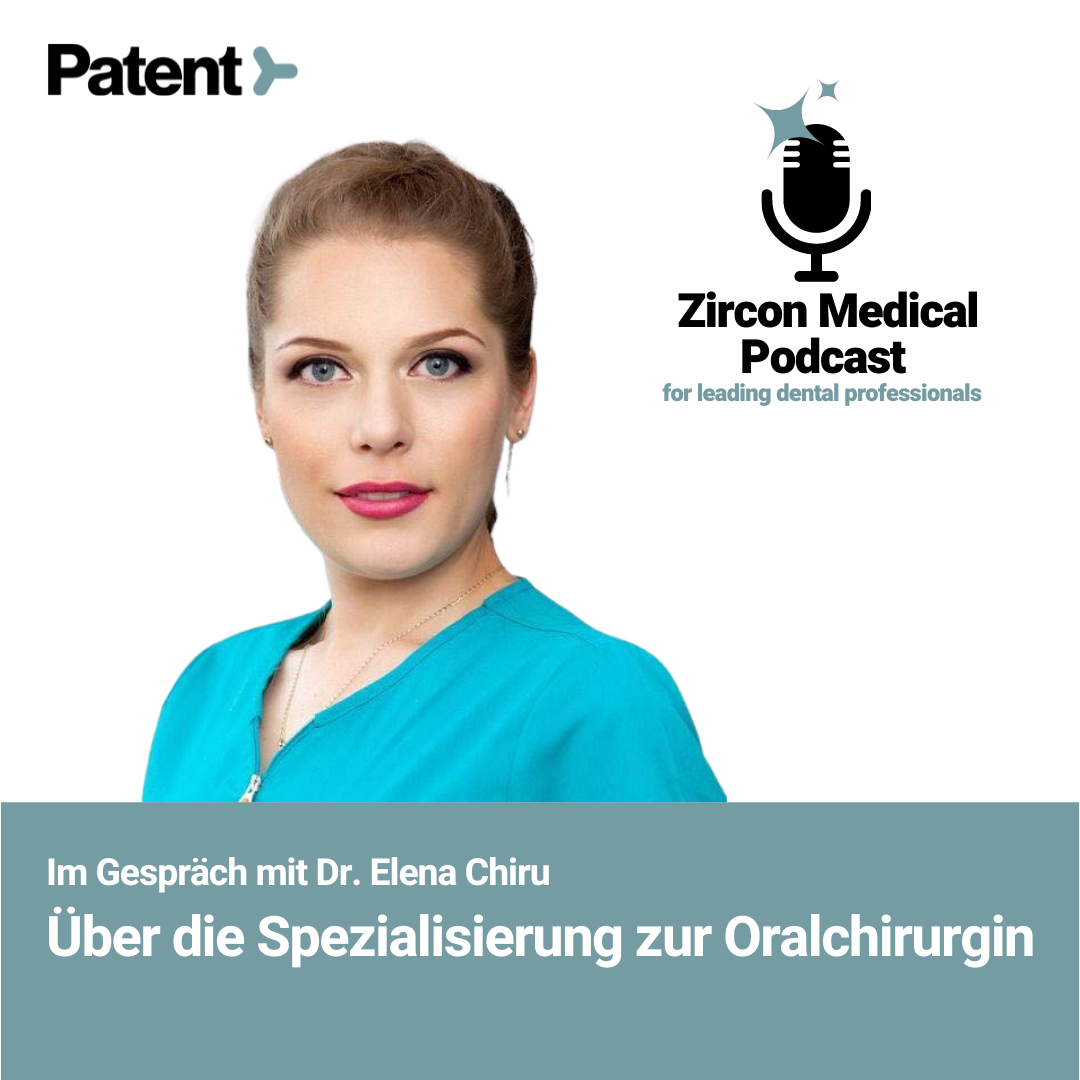Dr. Elena Chiru
Oral Surgeon at MVZ Klinger
Graduated from Carol Davila University in Bucharest in 2013.
Completed 3 years of residency training in oral surgery.
Location: Schopfheim, Baden-Württemberg, Germany
Zwischen den Wegen 27, 79540 Lörrach, Deutschland
In Conversation with Dr. Elena Chiru
Oral surgery is a complex field requiring considerable specialty, training, expertise, and patience. Younger dentists who want to specialize in oral surgery may have questions or concerns about the path forward. It helps to hear from someone who has successfully traversed the path, becoming a reputable oral surgeon in Germany.
Our team at Zircon Medical recently hosted Dr. Elena Chiruon our podcast series to discuss what it’s like to specialize in oral surgery.
Introducing Dr. Elena Chiru, the oral surgeon at MVZ Klinger
Dr. Elena Chiru graduated from Carol Davila University in Bucharest in 2013, following which she completed a 3-year residency training in oral surgery. After working in Romania through her 20s, she eventually moved to Germany and established herself as the leading oral surgeon at MVZ Klinger, a dental practice located in Schopfheim, Baden-Württemberg.
Dr. Chiru says she always wanted to be a doctor, ever since she was a little girl. “I used to carry a little box with me with all my treatments,” she says, recalling her childhood fascination with medicine. “I had a stethoscope, a needle, a tongue depressor, a knife, a plastic spoon, even a metal syringe without a needle… a little surgical set.”
Dr. Chiru settled on dentistry because the profession seemed extensive and versatile. After almost a decade of experience, she now confirms that dentistry requires a mixture of medicine, aesthetics, and technology. The field is rich with new patients, new developments, and new challenges that have to be overcome. That’s what she loves best about her profession.
After completing her dental studies, Dr. Chiru decided to continue with advanced training in oral surgery. “As a student, I found it fascinating,” she says. "The way you incise, raise a flap, remove tissue, and sew everything together, and then it looks like nothing happened.” She was also drawn to the fact that oral surgery involved considerable cooperation and teamwork.
The skills essential for oral surgery
• Making the Correct Diagnosis: While all fields of medicine necessitate making accurate diagnoses, Dr. Chiru says it’s especially important in surgery. The surgeon must make an accurate diagnosis and treatment plan ahead.
• Manage Complications Calmly: Regardless of the preparation, unexpected complications can occur during surgeries. If the complication is really bad, the surgeon can abort and continue another day. However, in most cases, they must keep a clear head and manage the situation without getting stressed.
• Neutral Self-Assessment: Dr. Chiru says all oral surgeons must have the capacity for neutral self-assessment. They must ask themselves how they performed, whether their decisions were correct, and if there’s any need for improvement
Making space for retrospection
Dr. Chiru says she takes photos sometimes during her operations or has her assistant do so. After the surgery, especially in complicated cases, she reviews the photographs to determine if everything went well. If she notices some things that didn’t go well, she determines alternatives treatment paths. She might crack open the books again, explore other possibilities, and come up with new techniques.
“If you just do the same thing all the time, your mind is fixed on one technique,” Dr. Chiru says. Using the same technique frequently creates a routine. On the one hand, it minimizes the chance of mistakes, but on the other hand, the “routine” may not suit all cases. Therefore, the surgeon has to keep an open mind and try different techniques according to the specific situation.
An example of a challenging case
When asked about a particularly challenging case, Dr. Chiru recalls one from her time during her residency program that was especially stressful.
Dr. Chiru had to remove a big inflammatory cyst that extended from tooth 47 to tooth 45, and it was right on the inferior alveolar nerve. Since it was so close to the nerve, the anesthesia took some time to kick in, and there was quite a lot of bleeding. But she successfully removed the cyst, and the patient didn’t have any complications, late effects, paralysis, or anything.
Preparing before an oral surgery
“In principle, you can plan for everything,” Dr. Chiru says when asked about preparing for surgeries.
Dr. Chiru starts the preparation by discussing the situation with her patients and taking their medical histories. “Ask the same questions two or three times,” she says, “even if the assistant had asked it before.” She repeats the questions to ensure the patients understand them, since an incorrect answer could increase the risk of postoperative complications.
After taking down all the information, Dr. Chiru goes through the entire procedure step by step with her patient. Patients are often stressed about surgeries, assuming that the worse will happen. However, most of that fear and stress come from a lack of awareness. Dr. Chiru says patients are far more likely to relax if they know what’s coming. And besides, discussing the procedure before the surgery with all the possible complications is also mandatory.
Dr. Chiru also studies the x-rays the day before the surgery. She examines the photographs, studies the x-rays, and makes a treatment plan. She emphasizes the need to focus on one step at a time. “You shouldn’t think about two things at once,” she says. "When I'm at the incision, I have to concentrate on the incision. Then I do the next step. I think in small boxes for the whole operation.”
Professional differences between Romania and German
Dr. Chiru says she moved to Germany as she turned 30 because she wanted a change. Her decision to move to Germany was fueled by multiple factors. She’d always wanted to learn the German language, and a friend of hers moved to Germany to practice dentistry, which encouraged her to do the same. While the move has been stressful, she’s ultimately happy with her decision.
When asked about the professional differences between Romania and Germany, Dr. Chiru says there aren’t any differences in terms of surgery. The tooth, surgery, and planning are all the same. However, the difference arises in patient expectations and how they work.
“In Romania, the patients are privately insured,” Dr. Chiru says. “If only private treatments are done, the working hours are more flexible. So, you might have to work until 8 p.m., even on weekends.” Dr. Chiru concedes that may be true even for the big cities in Germany, but things are a lot quieter in the countryside (Schopfheim Lörrach) where she works.
Dr. Chiru also says the patients in Germany are more independent. They can take time off work or get a certificate that they’ve been to the dentist, allowing them to seek treatment before 6 p.m. That allows dentists in Germany to enjoy more of private life. However, in Romania, patients often show up after work, so there’s less private life.
Dr. Chiru agrees that working late hours isn’t a problem early in one's career. Having lots of free time isn’t essential until you’re 30. “But at some point,” she says, “you need to have a private life.”
If you’d like to contact Dr. Chiru, you can follow her on LinkedIn or find her at her dental clinic in Schopfheim, Baden-Württemberg. You can also listen to heron our Zircon Medical podcast.
Register for our free newsletter.
Never miss one of our weekly episodes with leading dental professionals.












